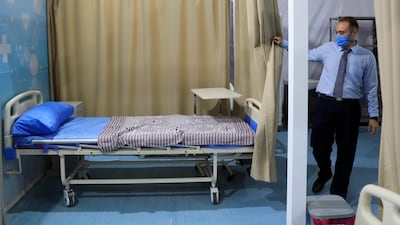Egyptians have reacted with anger and anxiety over the national Parliament's approval of a law allowing the private sector to administer the country's public hospitals.
For the country's poorest, who are already struggling with record-high inflation and diminishing state subsidies, public hospitals are the only viable healthcare option.
The draft law, part of the government's wider push towards privatisation that has also involved selling parts of the national power grid and lifting subsidies on food, fuel and education, has not yet been ratified by President Abdel Fattah El Sisi, the final step before it is implemented.
Although the ruling was widely condemned by Egyptians, many of whom were shocked to learn that such a critical component of the state's healthcare system was going to be privatised, it was largely anticipated by those with chronic illnesses who receive regular treatment at state general hospitals.

Those patients had observed a gradual decrease in the quantity of medication provided to them at hospitals over the past five years, as Saeed Al Torky, 83, who receives weekly chemotherapy at Al Demerdash General Hospital, recounts.
“I was diagnosed with cancer in my colon in 2018 and have been receiving chemotherapy at Al Demerdash since then. I also have to take a heap of pills every night for diabetes and high blood pressure. I need 10 boxes of medication per month, which used to be given to me by the hospital,” he told The National.
“But slowly since 2018, they started cutting one box every few months. They would tell me to buy it from an outside pharmacy. Today, the hospital only gives me three boxes and I have to buy the rest outside the hospital. It is very expensive.”
Though many public hospitals are known for being overcrowded and under-resourced, there has been a significant decline in capacity in recent years.
According to the Central Agency for Public Mobilisation and Statistics (Capmas), although the number of government hospitals increased slightly from 659 in 2014 to 664 in 2021, the number of beds fell by 14,800, a 15 per cent reduction.
As of 2021, there were only 83,000 beds available in public hospitals, down from 97,800 in 2014. Even when factoring in private hospitals, the country's overall bed capacity is a meagre 13 for every 10,000 citizens.
The strain on the healthcare system has resulted in many patients, including those with life-threatening illness, struggling to access care as public hospitals hit maximum capacity. The overcrowding has led to more allegations of hospital staff being bribed to move patients up the waiting lists.
“My aunt, who had been suffering from kidney failure, collapsed at home a couple of months ago,” said Ali Yassein, 43, a resident of Cairo's Haddayek Al Qubba district. “When we took her to Al Zawya General Hospital, she was turned away at the door because there was no room for her.
“She died that same day at home while we were trying to collect money to have her admitted to a private hospital.”
The law has also faced strong opposition from the medical community. The Egyptian Medical Syndicate argued it “threatens the safety and health of Egyptian citizens and the stability of the healthcare system”.
The syndicate warned the approved law provided no guarantees on the continuity of low-income patient care and allows the new investor to dismiss up to 75 per cent of hospital staff. It urged private investors to build new hospitals rather than take over public ones.
In an appeal to Mr El Sisi, the syndicate called on the President to use his constitutional powers to reject the law, saying it endangers both the country's doctors and vulnerable patients. He has not publicly responded.
As public anger over the privatisation plans spreads, many view it as the latest indication that the government, desperate to rescue a floundering economy, is abandoning its most vulnerable citizens.
“It's like the government is ruling over a completely different population,” said Yara Yassein, sister of Mr Yassein. “Do they not realise that most of the country is poor? Ever since what happened with my aunt, I have been living in fear of getting sick because that could happen to me, too.”
Egypt recently avoided bankruptcy through a series of foreign aid deals totalling more than $50 billion. Faced with massive debt reaching 94 per cent of GDP, the government has had to significantly restructure its economy under the direction of the IMF and other international partners.
Many Egyptians had hoped the influx of foreign cash would improve their lives after years of hardship. Many now realise the $50 billion has already been earmarked for longer-term projects that will have little near-term effect.
The gradual erosion of public health care, long foreshadowed by diminishing hospital capacity and medicine, has left the poor in an increasingly precarious position as they already face rising costs from food to energy.


